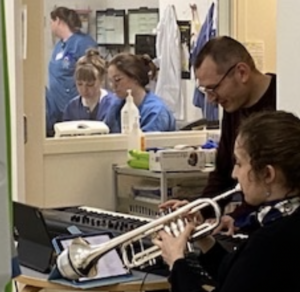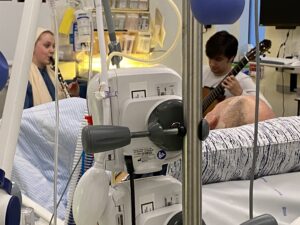Live music in the ICU
- A qualitative study of music students’ perspectives

by Associate Professor Margrethe Langer Bro et al.
Live music in the ICU: A qualitative study of music students’ perspectives is the title of an article published by Margrethe Langer Bro and colleauges in Musicae Scientiae. The article reports results of an artistic research project that Bro has led in cooperation with Danish National Academy of Music, Denmark, Royal Academy of Music, Aarhus, Denmark, Hanze University of Applied Sciences, Netherlands University of Music and Performing Arts, Vienna, Austria, Aarhus University Hospital, Denmark, University Hospital of Southern Denmark, Denmark and Aarhus University, Denmark. The project was funded by The Danish Arts Foundation, The Royal Academy of Music, Aarhus, and The Danish National Academy of Music and the Danish Artistic Research funding Program.
Abstract
The aim of this hermeneutic-phenomenological study was to explore how 26 music students experienced their artistic practice in and adapted to the intensive care environment. The students participated in a standardized training and performance program, offering patient-tailored music interventions for patients in the intensive care unit (ICU) at two hospitals in Denmark. Each intervention comprised three components:(1) briefing on the patients’ physical and mental condition, (2) intervention, (3) debriefing by the primary investigator, the participant(s), and a nurse. A total of 33 semistructured one-to-one interviews and 135 in vivo observations were conducted during the study, and two semistructured focus-group interviews were carried out afterwards. The analysis revealed five themes concerning artistic practice: (1) Openness to the unknown setting; (2) Heartfelt music with a simple and intimate expression; (3) Sensitivity to the room, bringing artistic awareness to the forefront; (4) Human connectedness through music; and (5) Expanding one’s musical identity. Overall, the participants’ personal, professional, and artistic awareness was further developed, and a nuanced and sensitive attention emerged, achieving artistic flow in the patient’s room. The participants’ values and attitudes entailed trust, honesty, commitment, openness, compassion, and situational awareness while maintaining artistic integrity. A deepened meaning of musical identity arose, discussed here in relation to George Herbert Mead’s theories of the social self. Higher music education (HME) institutions may consider further developing programs for music students that reflect these values and attitudes along with artistic and reflective practices to enhance the role of music in healthcare, thereby contributing to enhanced wellbeing and a sense of cohesion.
Read the full article here: https://journals.sagepub.com/doi/10.1177/10298649241300440


